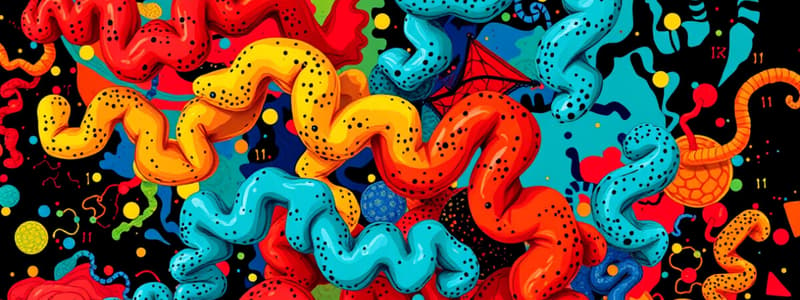Podcast
Questions and Answers
What do proteins provide for growth and maintenance?
What do proteins provide for growth and maintenance?
- Vitamins
- Carbohydrates
- Fats
- Amino acids (correct)
All enzymes are proteins.
All enzymes are proteins.
True (A)
What role do some proteins play in relation to hormones?
What role do some proteins play in relation to hormones?
Chemical messengers
How do proteins assist the body in resisting disease?
How do proteins assist the body in resisting disease?
What is one function of proteins in regards to fluid balance?
What is one function of proteins in regards to fluid balance?
What role do proteins play in acid/base balance?
What role do proteins play in acid/base balance?
How do proteins facilitate transportation throughout the body?
How do proteins facilitate transportation throughout the body?
What do proteins form that are vital parts of the body?
What do proteins form that are vital parts of the body?
How can protein contribute to the body's energy needs?
How can protein contribute to the body's energy needs?
Flashcards are hidden until you start studying
Study Notes
Functions of Proteins in the Human Body
-
Growth and Maintenance
- Proteins serve as building materials, supplying amino acids essential for the growth, repair, and replacement of body tissues.
-
Enzymatic Functions
- All enzymes are proteins that facilitate various chemical reactions essential for metabolic processes in the body.
-
Hormonal Roles
- Certain proteins act as chemical messengers known as hormones, regulating various physiological processes, though not all hormones are protein-based.
-
Immune Defense
- Proteins contribute to the immune system by producing antibodies that help protect the body against foreign pathogens.
-
Fluid Regulation
- Proteins play a crucial role in maintaining fluid balance across body compartments, preventing excess fluid accumulation or dehydration.
-
Acid/Base Balance
- Proteins act as buffers to maintain stable acid-base concentrations in bodily fluids, ensuring homeostasis in pH levels.
-
Transportation and Distribution
- Proteins facilitate the movement of nutrients and substances into and out of cells, as well as throughout the bloodstream, ensuring proper distribution across the body.
-
Structural Components
- Essential body structures, including skin, nails, hair, membranes, muscles, teeth, bones, organs, ligaments, and tendons, are predominantly composed of proteins.
-
Energy Source
- Proteins can be metabolized to provide energy, yielding four calories per gram to help meet the body's energy requirements when needed.
Studying That Suits You
Use AI to generate personalized quizzes and flashcards to suit your learning preferences.




